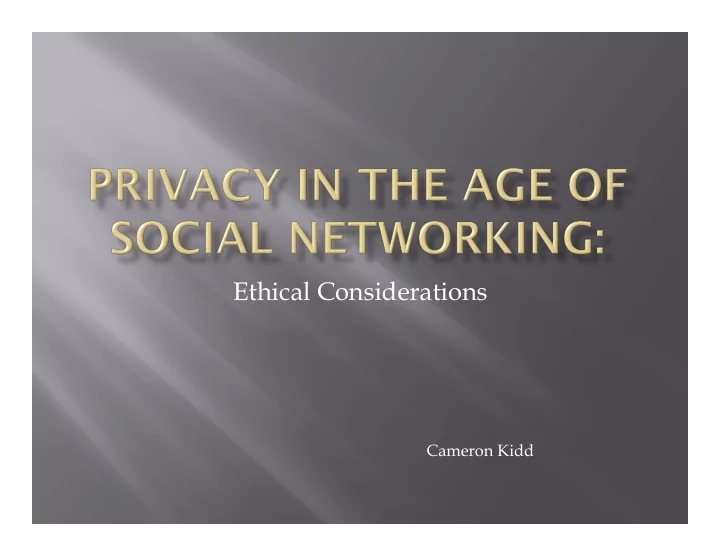

Ethical Considerations Cameron Kidd
First social network site SixDegrees.com launched in 1997 Friendster, the first fairly successful SNS with around 300,000 users, but was plagued by technical issues among other things MySpace was first to garner media attention, sold for $580 million to news Corp in 2005, helped to push social networking into the main stream Facebook arrived in 2004 but was not open to everyone until 2006, has quickly become the dominant SNS Beginning of a new web paradigm linking networks of websites with users, by their preferences and personal information
Allows people to connect with old friends or stay in touch with family Meet new people Share ideas with like minded people Easily share media: pictures, music, videos Great marketing tool Opportunities for profit
People are putting large amounts of personal information on sites like Facebook 88 % revealed their birthdays, full name 83% public wall posts 75% access to photos 88% Friends 84% gender 82% access to applications 50% email addresses, political, religious affiliation 10% included zip code, home address, phone numbers
Can lead to identity theft Threats to personal safety Social risk of self-identification with a minority or stigmatized social group Will your future employers judge you based on online profile? Can information be used in court to incriminate you? Information can be sold to advertisers for targeted ads.. Applications can be built to mine public data
Zuck: Yeah so if you ever need info about anyone at Harvard Zuck: Just ask. Zuck: I have over 4,000 emails, pictures, addresses, SNS [Redacted Friend's Name]: What? How'd you manage that one? Zuck: People just submitted it. Zuck: I don't know why. Zuck: They "trust me" Zuck: Dumb [expletive]
Facebook using classic bait and switch tactics, repeatedly making changes to default settings. As of April everything on profile was default made public Shares your data with 3 rd party websites May 21 st Wall Street Journal finds Facebook and MySpace have been sending data to advertising companies that can be used to identify you Takes a 33 page tutorial to show how to lock down personal information, 50 settings, 170 options Has a track record of unethical behavior Beacon advertising, tracks user behavior, automatically opted-in Lost a class action law suit $9.5 million over beacon
Many people are unaware of how information is being used Direct correlation between age an quantity of public exposure Corporations whose main motivation is profit do not have your best interest in mind.. Too many hands in your personal information and not enough safeguards.. Facebook, etc have the ethical responsibility to the assured privacy of your information..
Boyd, D. M., Ellison, N. B. 2007. Social network sites: Definition, history, and scholarship. Journal of Computer-Mediated Communication , 13 (1), article 11. http://jcmc.indiana.edu/vol13/issue1/boyd.ellison.html Carlson, Nicholas. May 13 th 2010. Well, These New Zuckerberg Ims Won’t Help Facebook’s Privacy Problems. BusinessInsider.com. URL: http://www.businessinsider.com/well-these-new-zuckerberg-ims-wont-help-facebooks- privacy-problems-2010-5 Gates, Gilbert. May 21 st 2010. Facebook Privacy a Bewildering Tangle of Options. New York Times. URL: http://www.nytimes.com/interactive/2010/05/12/business/facebook-privacy.html Kirkpatrick, Marshall. Jan. 9 th 2010. Facebook’s Zuckerberg Says the Age of Privacy is Over. ReadWriteWeb.com. URL: http://www.readwriteweb.com/archives/ facebooks_zuckerberg_says_the_age_of_privacy_is_ov.php Nosko, Amanda. Et al. May 2010. All About Me: Disclosure in Online Social Networking Profiles: The case of Facebook. Computers in Human Behavior. N.Y. vol. 26, no 3, pg 406. Steel, Emily. Vascellaro, Jessica E. May 21 st 2010. Sites Confront Privacy Loophole. The Wall Street Journal. N.Y. pg. B1N
Recommend
More recommend